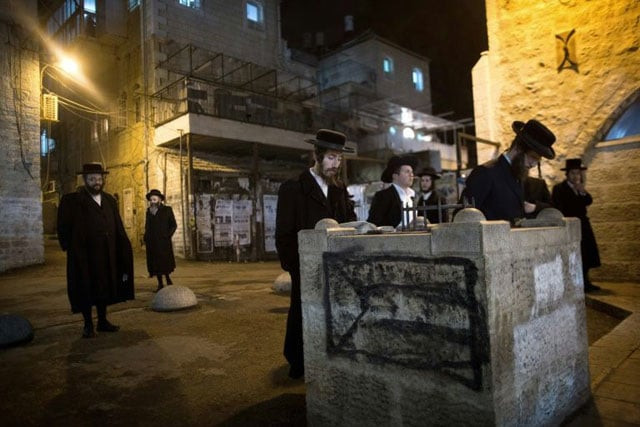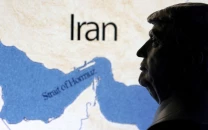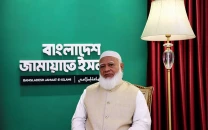Israel law renews hot debate on army service for ultra-Orthodox
Some see military service as key to integrating them into society - but that's why many oppose it

Ultra-Orthodox Jewish men pray to protest against military service in Jerusalem's ultra-Orthodox Mea Shearim neighbourhood. PHOTO: AFP
He denies they assaulted him, but admits they shouted him down.
The incident last year led to the arrest of 19-year-old Croise, followed by his detention for around a week for having failed to enlist in the army.
Video celebrating Palestinian baby's death inflames Israel debate on Jewish violence
"I explained to them that we are Jewish people. We don't believe in the state," Croise said before lighting a Hanukkah festival of light candle in front of his home among the narrow streets and stone buildings of Jerusalem's ultra-Orthodox Mea Shearim neighbourhood.
"We don't go to the army," he added, wearing the wide-brimmed hat and black coat common to the ultra-Orthodox, the strictly religious Jews who abide by a traditional lifestyle.
A decades-old debate over whether ultra-Orthodox young men studying at seminaries should perform mandatory military service like the rest of Israel's Jewish population has flared again.
In November, lawmakers passed legislation extending their exemption from duty, reversing a law passed in 2014 that would have seen it expire.
But ultra-Orthodox must go to the enlistment office to qualify for exemption - which some refuse to do because of their rejection of the state - and Croise was detained on a technicality.
The issue reverberates strongly in the Jewish state, illustrating the divide between the ultra-Orthodox and their secular or less strictly religious compatriots.
The ultra-Orthodox currently make up between seven and 10 percent of Israel's more than eight million population, but are among its fastest-growing communities.
At the same time, unemployment is high and 54 percent of ultra-Orthodox families are considered poor.
Some see military service as key to integrating them into society - but that's why many oppose it.
Meet the Muslim soldiers who fight for Israel
"This is exactly what's threatening the ultra-Orthodox," said Mordechai Goldman, a consultant on ultra-Orthodox issues and analyst for the Al-Monitor website.
"They want to preserve their identity."
'New intellectual elite'
Military service is required for Jewish Israelis after they turn 18 - three years for men and two for women.
Ultra-Orthodox men studying in seminaries, or yeshivas, are exempt. Women from ultra-Orthodox families also do not serve.
They are against it for a variety of reasons, with the most extreme believing a Jewish state is not allowed before the coming of the Messiah.
Others argue that yeshiva study is just as important to Israel as military service or that ultra-Orthodox soldiers would be confronted with salty language and other unreligious behaviour.
The law change followed March elections that led to Prime Minister Benjamin Netanyahu assembling a coalition with only a one-seat majority in parliament.
Ultra-Orthodox parties agreed to join on condition that last year's law, which would have ended the exemption in 2017 and set out criminal penalities, was rolled back.
Hezbollah buries militant Qantar, vows to retaliate against Israel
The law had also allowed for civil service in place of military service.
The new law extends the exemption by six years, then sets out a three-year period when the defence minister can decide how to move forward.
It was the latest move in a debate that dates back to the early days of Israel's creation in 1948.
Founding father of Israel and former prime minister David Ben-Gurion granted the exemption due to special circumstances of the era, said Yedidia Stern of the Israel Democracy Institute.
It was shortly after the Holocaust, "when the majority of yeshiva students basically disappeared, many rabbis were killed, the whole world of Torah (holy books) was basically destroyed", he said.
His decision was "based on the understanding that it is just for a while to create a new intellectual elite".
At the time, it involved 400 students. Today the number is in the tens of thousands and the population is growing quickly, with ultra-Orthodox families often having large numbers of children.
Croise, the 19-year-old from Mea Shearim, is one of 16 siblings.
'They can kill me'
The military has been seeking to encourage the ultra-Orthodox to join.
It has created special units, allowing them to continue Torah study and limit interactions with women - a religious requirement.
A total of 1,972 ultra-Orthodox joined in 2014, the military says, with the numbers having steadily increased.



















COMMENTS
Comments are moderated and generally will be posted if they are on-topic and not abusive.
For more information, please see our Comments FAQ